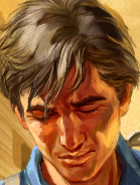Who Will Be Great Poem by David Welch
Who Will Be Great
If you look at ol' Bram Stoker,
Irish writer of Dracula fame,
it can be quite hard to believe
that any remember his name.
At first just a civil servant,
then he managed a London stage,
doing books for Henry Irving,
a great actor of the age.
Then he somehow writes a novel,
of a distant, cruel vampire,
the critics liked the way he wrote,
but the book hardly inspired.
Sales were steady, but most thought it
a good thriller, nothing more,
if you said it was ‘Literary'
their jaws would've hit the floor.
But the book kept going steady,
it has never been out of print,
Hollywood put it on the screen,
and the studios made a mint!
It codified a sub-genre,
has defined the vampire's ways,
when modern minds think of these fiends
they see Dracula to this day.
Henry Irving is long forgotten,
but Stoker we appreciate,
modern horror is in his debt,
you never know who will be great.
If you look at Stephen Foster,
who wrote songs for the minstrel shows,
you wouldn't expect a genius
that all of the world would know.
He was another bookkeeper
for a steamship company,
until he started writing tunes
that to this day sound masterly.
Today those same minstrel shows
seem quite insulting to good minds,
they weren't exactly ‘High Culture'
way back in Foster's time,
but the man wrote Old Susanna,
and My Old Kentucky Home,
the Swanee River, Camptown Races,
and Hard Times Come Again No More.
Even Beautiful Dreamer,
and Genie With The Light Brown Hair,
the amount of hits this man wrote
can drive musicians to despair.
From throw-away entertainment
that never got a second look,
this man alone wrote the core of
The Great American Songbook.
That he still remains relevant,
even known at this late date,
show that we never can predict
who exactly will be great.
And final who can forget
this world's greatest writer, The Bard,
who made up huge chunks of our language,
the most recognized scribe, by far,
was dismissed as just an upstart
back when he was writing his plays,
mere iambic entertainment,
nothing with the power to stay.
Despite Shakespeare's theater success,
it was by many people said
that his was fodder for the peasants,
not the poetry of the learned.
It seems Bill bought into this rot,
and never published his own plays,
didn't think it worth the trouble
to try and sell them in his day.
It was only a group of his friends,
after Bill was put in the ground,
who published that first folio
so all his tales could be passed down.
Imagine there's no Romeo,
no Hamlet and no MacBeth,
that's very near happened when
William Shakespeare met his death.
How would literature have gone
if none of his great works survived?
Our very words would be different
with no Shakespeare in our lives.
Goes to show how little we know,
and how chance almost seems like fate,
when even the very best of us
cannot realize that they're great.
This poem has not been translated into any other language yet.
I would like to translate this poem